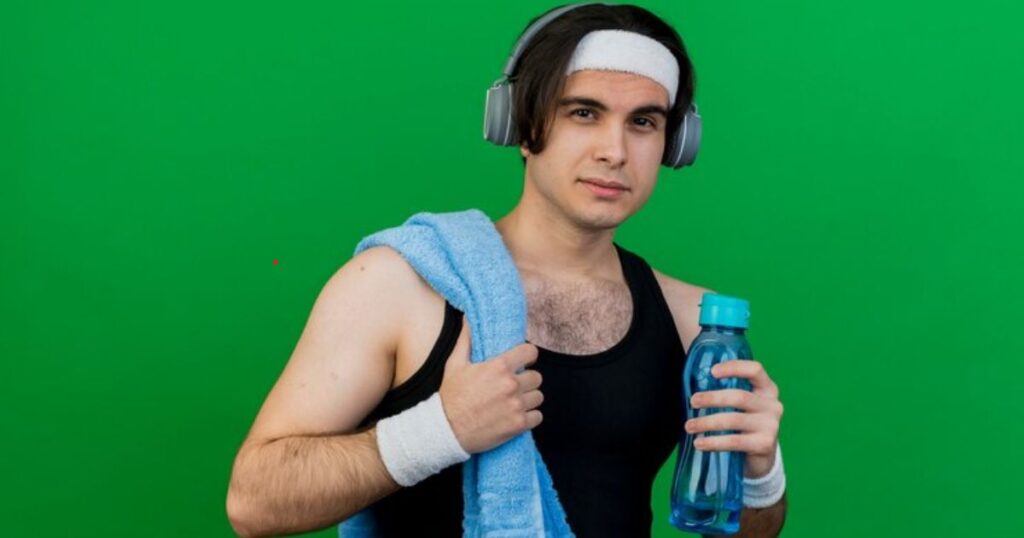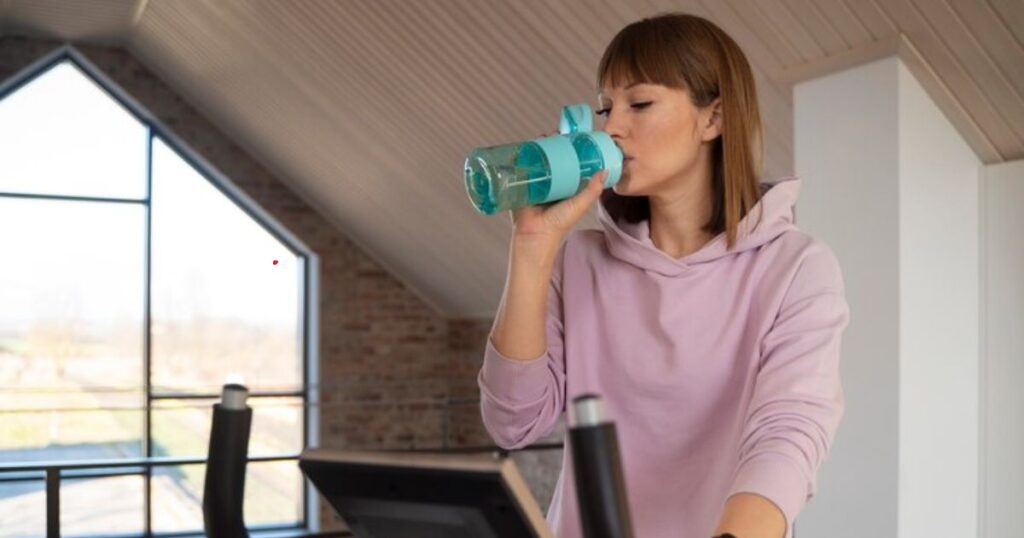When you take creatine, you might have heard that drinking enough water is crucial. But how much water do you absolutely need to drink while using creatine? This guide will help you understand how creatine and water work together. It explains everything you need to know so you can stay healthy and get the best results from your supplement.
What Is Creatine?
Creatine is one of the most popular supplements for boosting performance, particularly in strength training and high-intensity exercises. A natural compound found in muscle cells. It helps produce energy during heavy lifting or short bursts of intense activity.
How Does Creatine Work?
Creatine is a natural chemical found in your muscles. It helps produce energy during intense activities like weightlifting and sprinting. Taking creatine pills increases the quantity of creatine stored in your muscles. This extra creatine helps your muscles produce energy more quickly.
This is how it works.
- Energy Production: Creatine stimulates the production of ATP (adenosine triphosphate), the primary energy source for muscular contractions.
- Better Performance: More ATP helps your muscles work harder for longer. This boosts performance during short, intense exercise.
- Muscle Growth: Creatine can increase water content in your muscles, making them appear larger and more hydrated.
Related: Can You Mix Creatine with Pre-workout?
Why Hydration Is Important When Taking Creatine?
Hydration is essential when taking creatine since it draws water into your muscles, potentially increasing their water content. If you don’t drink enough, your organs may receive less water. Proper hydration helps to maintain the balance of fluids in your body and promotes overall health.
- Dehydration: Creatine boosts water intake in your muscles, so if you don’t drink enough, you risk dehydration.
- Supports Muscle Function: Staying hydrated allows your muscles to operate better during exercise and recover more quickly afterward.
- Controls Body Temperature: Water keeps your body cool during workouts, which is especially crucial when creatine boosts activity intensity.
- Reduces Cramping Risk: Proper hydration helps to avoid muscle cramps and pain during physical exertion.

Does Creatine Cause Water Retention?
Creatine supplements can cause water retention, enhancing muscle performance and growth. This results in increased muscle volume, making muscles appear fuller and larger. However, this increase in water content may lead to temporary weight gain, primarily because of increased water content.
Staying well-hydrated is crucial to prevent dehydration and maintain overall body function. Individual responses to creatine may vary.
How Much Water Should You Drink While Taking Creatine?
When you take creatine, it’s important to drink enough water. Creatine can make your muscles hold more water, so you need to drink more to help with that.
People often say you should drink 8 to 10 glasses of water each day. This is about 2 to 3 liters, especially when taking creatine. But if you exercise a lot or do tough workouts, you might need to drink even more.
A good tip is to pay attention to your body. Drink water when you’re thirsty and make sure your pee stays light yellow or clear. Drinking enough water helps creatine work better. It also prevents thirst and muscle cramps.
To figure out how much water you need to drink every day, you can use your weight to help. A simple way to do this is by drinking 0.03 liters of water for every kilogram you weigh. For example, if you weigh 70 kg (which is about 154 pounds), you should try to drink at least 2.1 liters of water each day. But, if you’re taking creatine, you should drink more, around 3 to 4 liters of water daily.

Side Effects Of Low Water While Taking Creatine
1. Dehydration
One of the most immediate consequences of low water intake is dehydration. Symptoms include:
- Dry mouth
- Thirst
- Fatigue
- Dizziness
- Dark yellow urine
Dehydration can impair physical performance, decrease strength, and increase the risk of injuries during workouts.
2. Muscle Cramps
Muscle cramps may become more common after using a creatine supplement, especially if you’re dehydrated. Lack of water can impair muscle function, resulting in cramps or uncontrollably contracted muscles.
3. Gastrointestinal Issues
Low water intake while taking creatine can lead to gastrointestinal discomfort, including:
- Bloating
- Diarrhea
- Nausea
The intestines absorb creatine. Without enough water, digestion may suffer. This may cause unpleasant side effects.
4. Impaired Performance
Hydration is critical for optimal athletic performance. Insufficient water intake while supplementing with creatine can result in:
- Decreased endurance
- Reduced strength
- Lower overall performance in workouts
When the body is dehydrated, it cannot sustain high-intensity activities effectively, leading to subpar performance.
5. Increased Risk of Kidney Strain
The kidneys are responsible for processing creatine, and dehydration can further tax these systems. When using creatine, long periods of dehydration can increase creatinine levels. Creatinine is a byproduct of creatine metabolism. Over time, high creatinine levels may affect kidney function.

Practical Tips to Stay Hydrated While Taking Creatine Supplements
When taking creatine supplements, staying hydrated is critical for improving performance and limiting any negative effects. Here are some advanced strategies to help you stay well hydrated:
- Increase Your Daily Water Intake: Creatine drives water into your muscles, which can leave the rest of your body dry. To balance this, aim for an extra 500-1000ml of water on top of your usual intake. A typical advice is to drink at least 3-4 liters every day.
- Spread out your water consumption: Instead of gulping it down all at once, sip it throughout the day. This aids in maintaining consistent water levels without overpowering your system.
- Electrolyte Balance: Hydration involves more than simply water. Supplementing with electrolytes (sodium, potassium, and magnesium) helps your body retain water properly. Look for electrolyte drinks or add a pinch of Himalayan salt to your water to improve fluid retention.
- Monitor Urine Color: Observing your urine is a simple but efficient approach to measure hydration. It should be a faint yellow. If it’s darker, drink more fluids; if it’s clear, you could be overhydrating.
- Drink Around Workouts: Because creatine improves workout performance, you’re more likely to sweat when exercising. Drink water before, during, and after exercise to replace fluids and increase muscular performance.
- Limit Diuretics: By encouraging water loss, alcohol and caffeine can exacerbate dehydration. A small amount of caffeine can help your performance during exercise. However, be careful about how much you consume. If you take diuretics, drink extra water to stay hydrated.
- Use a Hydration Reminder: To help you drink water all day, set hourly reminders on your phone. You can also use a smart water bottle that tracks your hydration.
Conclusion
Creatine is a great supplement that helps you do better in your workouts, but you need to make sure you’re drinking enough water. Try to drink 3-4 liters of water every day, and drink even more when you are exercising while taking creatine. Watch out for signs that you’re not getting enough water, like feeling thirsty or tired. By doing this, you can safely use creatine and get the most out of it.
People Also Ask
1. How much water should I take with creatine?
When using creatine, you should have 8–10 glasses of water (or roughly 2-3 liters) per day. Because creatine draws water into your muscles, this keeps your body hydrated—something you should always be doing.
2. Why do I need to drink more water with creatine?
Your muscles can hold more water if you take creatine. Insufficient hydration can cause fatigue, vertigo, and cramps. When utilizing creatine, your body functions better when you drink water.
3. What happens if I don’t drink enough water with creatine?
You run the risk of dehydration if you don’t drink enough water. This indicates that your body isn’t getting enough water to function properly. You may experience headaches, weakness, or nausea.
4. Can drinking too much water with creatine be bad?
While experts generally recommend consuming a large amount of water, exceeding 5 liters may harm your health. You may lose important salts from your body, which could make you feel sick.
5. When should I drink water while using creatine?
Water is the greatest beverage to have throughout the day. When taking creatine, drinking some with your meals and during your workout is a good idea. Your body maintains constant hydration in this way.









Leave a Reply